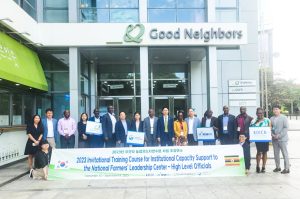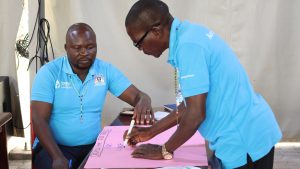
H.E. Vice President of Uganda Maj. (Rtd) Jessica Alupo represented the President and delivered his speech:
I am honored to preside over Uganda’s 13th Africa Public Service Day 2024 commemoration. I commend the Ministry of Public Service for organizing and mobilizing all ministries, departments, agencies, and local governments for their active participation in this event. Today, we gather to celebrate our service to the nation and reflect on the public service’s performance, challenges, opportunities, and successes. An efficient and effective public service sector is essential for delivering public services.
Recognizing the public sector’s importance and its contributions to citizens is crucial. Public service delivery in Uganda has significantly improved through the automation of various processes and government institutions, enhancing efficiency, effectiveness, and transparency. Ministries, departments, and agencies are now more responsive to their clients, which improves the public service and the government’s reputation.
National Farmers’ Leadership Centre (NFLC) exhibition on the Africa Public Service 20224
Regarding the theme of empowering citizen-centric public service for an inclusive and thriving 21st-century Africa, the Government of Uganda has made significant strides in empowering Ugandans. The NRM government emerged from the people’s struggle for democracy and is the first post-independence government to democratize the state, devolve power and resources, and place people at the center of the development agenda. This ideology drives all government policies, programs, and actions. Public sector reforms have aimed at increasing access and affordability for the common man, resulting in tremendous economic growth and development since the NRM government took power. Uganda’s highest-ever growth rate and the elevation of millions from poverty to middle-income status are not by chance but due to government efforts. I commend the public service for achieving these milestones and thank the security sector for its crucial role in our country’s development. A stable security sector is vital for national development and transformation.
I challenge the public service to uphold and advance reforms for more efficient service delivery by:
- Eliminating corruption
- Increasing and accelerating grassroots service delivery
- Avoiding cliques and adopting a whole-government approach, as introduced in the National Development Plan III
- Adhering to service delivery standards and building global partnerships
- Reducing barriers to service access for the poor to enhance coverage and participation
- Expediting resource allocation to the community level
- Implementing one-stop centers and automating services
- Regularly reviewing business processes to capture new trends
- Holding regular Baraazas to ensure transparency and citizen participation
By following these steps, we will see continuous growth and progress in our country’s development.
Ladies and Gentlemen, it is my pleasure to close the 13th commemoration of Africa Public Service Day on June 27, 2024.
NFLC exhibited Mindset change ideology, value addition for coffee, mushroom production, Indigenous Micro-organisms (IMO) in piggery, and Banana production.

The exhibition involved a beneficiary from the Kkumbya coffee cooperative demonstrating how a group of members from Kkumbya village attended a mindset change training at NFLC focusing on coffee value addition and later started a coffee cooperative for coffee value addition, processing into powder, packaging, and marketing.

The Permanent Secretary, Mrs. Catherine B. Musingwiire,
In her speech, she said that the Ministry of Public Service is committed to monitoring targets, encouraging innovation, prioritizing staff welfare, and implementing one-stop center concepts. As a government, it is our responsibility to inform the public about our activities. I urge everyone to thoroughly revise the Brazas to enhance stakeholder engagement and promote transparency, accountability, and interaction. These measures will make public services more responsive to citizens’ needs, facilitating development, socio-economic transformation, and the achievement of Vision 2040.
The Ministry of Public Service is implementing several key reforms, including the capital management system and government rationalization. We believe that leveraging IT will enhance human resource management across the public service once fully implemented.
Your Excellency, this year’s African Public Service Day featured numerous activities starting on June 21, 2024, with a sports gala at Makerere Main Ground, involving 23 government ministries, departments, and agencies in various sports. There were also corporate social responsibility activities such as blood donation by Uganda Police, building a fence around Shimoni Demonstration School, and cleaning Parliamentary Avenue.
We guided local governments to hold open days at district headquarters to provide information and services to citizens. I thank all ministries, departments, agencies, and local governments for their participation. The Ministry of Public Service pledges to make next year’s African Public Service Day even more meaningful, allowing the public to interface with us and understand our work better. We hope to secure more resources to make this event a larger national celebration, building public trust through transparency.

I am honored to welcome our guest of honor, H.E. the Vice President, and the Ministers present today. The Permanent Secretary, who is the head of Public Service and Signal Cabinet, is also here with us. It is a privilege for me to present this paper on this African Public Service Day.
Today, we emphasize the significance of this day. As a country, we stand out with our population, heritage, and growing technological capabilities. Transforming public service into a citizen-centric system is crucial. We need a public service that understands and meets the needs and expectations of the citizens, focusing on service delivery.
The objectives of today’s public service are as follows:
- Recognize and Appreciate: To recognize and appreciate the dedication and hard work of public servants who play a vital role in nation-building and service delivery.
- Promote Best Practices: To learn from each other and promote the best practices within the service.
- Raise Awareness and Advocacy: To raise awareness about the importance of efficiency and responsiveness in public service, crucial for achieving the Sustainable Development Goals.
- Motivate Public Officers: To recognize and motivate public officers to strive for excellence.
- Engage in Dialogue: To engage in dialogue among public servants, government officials, and citizens on how to improve public service delivery.
To achieve this, we must prioritize:
- Digital Transformation: Emphasize governance platforms and digital tools to improve service delivery and help citizens.
- Sustainable Development Initiatives: Showcase projects that align with the Sustainable Development Goals.
- Inclusive Public Service Programs: Promote inclusivity, gender equality, and empowerment of marginalized communities.
- Citizen Participation: Ensure that citizens are included in all decisions, fostering comprehensive participation and collaboration.
- Lifelong Learning: Emphasize continuous education and skill development to keep pace with global advancements.
- Capacity Building: Develop the capacity of public officers to deliver services efficiently.
- Technology Integration: Leverage technology to enhance service availability and citizen involvement.
- Cybersecurity: Ensure robust cybersecurity measures to protect public information and maintain the integrity of government digital services.
We also need to address challenges such as:
- Digital Divide: Bridge the gap in access to technology between ministries, departments, agencies, and local governments.
- Resistance to Change: Conduct change management initiatives to overcome resistance to new systems.
- Resource Constraints: Utilize resources efficiently to achieve intended goals.
- Digital Literacy: Train public servants to equip them with the necessary skills to utilize new technologies.
- Public Awareness: Educate citizens about available innovations and services.
Key recommendations include:
- Develop Policy Frameworks: Support lifelong planning and technological integration in public services.
- Public-Private Partnerships: Encourage collaboration between government, private, and civil society sectors.
- Monitoring and Evaluation: Establish effective monitoring and evaluation systems for continuous improvement.
- Knowledge Management: Invest in systems that facilitate efficient knowledge capture, sharing, and use across government agencies.
In conclusion, empowering a citizen-centric public service in Uganda requires a dual focus on lifelong learning and technological transformation. By prioritizing inclusivity, leveraging technology, and fostering continuous education, Uganda can create a resilient, responsive, and thriving public service. Each one of us has a role to play in this transformative journey.





